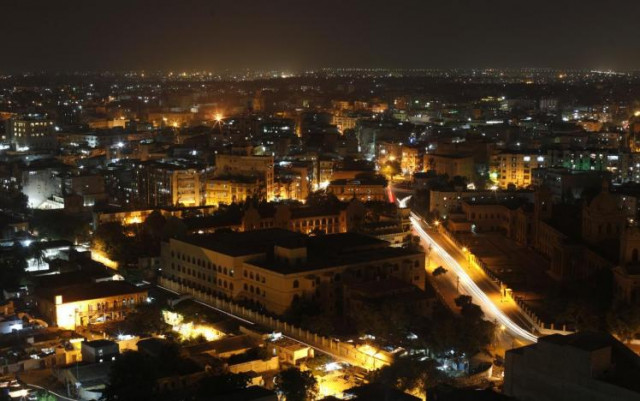Pakistan can improve ranking by adopting ICT
Govt departments have thus far relied less on information technology

Skyline image of Karachi city at night. PHOTO: REUTERS
This is not an isolated story, many people encounter similar issues in the country. Pakistan is listed among worse countries in the Ease of Doing Business index of the World Bank. Its ranking in the index is 147th while neighbouring India is on 100th place.
Experts suggest lack of reliance on information and communication technology (ICT) in government departments is holding Pakistan back from improving its ranking in the index. ICT can drive Pakistan forward by facilitating seamless integration of systems and processes.
Pakistan’s ranking has consistently gone down from 105 in 2012 to 128 in 2015 and now it stands at 147th place.
According to the Ease of Doing Business indicators, after the ease of tax payments, Pakistan has performed worst in contract enforcement.
On the World Economic Forum’s Networked Readiness Index, Pakistan is at 110th position.
India is ranked 91st, Sri Lanka 63rd and China 59th on the index, which is also called the Technology Readiness Index that measures the tendency for countries to exploit the opportunities offered by ICT.
In 2012-13, Pakistan registered 3,953 companies and got 142nd ranking from the World Bank in the ‘starting business’ indicator. New Zealand was the best as it registered 44,045 companies, which was 11 times more than that in Pakistan.
The gap increased to 13 times in 2015-16 as Pakistan registered 6,200 companies while New Zealand registered 80,670 companies.
Pakistan takes 17.5 days to register a company while in New Zealand a company can be registered in only half a day.
The World Bank suggests Pakistan should make Securities and Exchange Commission of Pakistan’s (SECP) e-services portal effective in order to enable businessmen to get their company’s name and digital signature registered online and pay in lump sum the fee through a debit/credit card or through mobile banking and other electronic means.
According to the World Bank, companies should be able to receive their National Tax Number (NTN) and get registered online for sales tax payments. They should also be able to get their employees registered with the Employees’ Old-Age Benefits Institution (EOBI) through the web portal. Applicants should be able to download all information from one portal from registration certificates to registration numbers issued by different departments, suggests the World Bank.
To get a construction permit, it takes 266 days in Pakistan’s city Lahore whereas the best-ranked Denmark takes only 64 days.
World Bank suggests expediting the automation of urban land record on the Land Record Management Information System (LRMIS) to reduce this gap. LRMIS should also display court proceedings and stay orders, if any.
All rules, regulations and procedures for dealing with construction permits be listed and placed on one website, it says.
Getting electricity connection in Pakistan takes 117 days, which places it on 167th rank. In this indicator, the United Arab Emirates has the highest standing which takes only 10 days. An e-portal should be established for new electricity connections and other services where an applicant could submit his application along with all required documents, suggests the World Bank.
This portal should be integrated with the SECP, LRMIS and NADRA database for verification of a company’s information. The portal should also allow online banking, accept credit/debit cards, mobile banking and other electronic transfers for fee submission.
In the registration of property, Pakistan is ranked 170th as it takes 56 days and requires seven procedures compared to the best-ranked New Zealand that takes only one day with two procedures.
LRMIS should be linked directly with the NADRA database and all court proceedings and stay orders should be recorded on LRMIS database, says the World Bank.
Pakistan is ranked 105th in the ‘getting credit’ indicator as it provides 15.4% of gross domestic product (GDP) in financing while New Zealand, which is at the top place, gives 146.2% of GDP in bank credit.
In order to increase the ratio, the World Bank suggests banks should have access to LRMIS and SECP database for easy verification of a company’s assets and other statistics.
In Pakistan, registered taxpayers shrank 10% in the current fiscal year, experts say, and the big reason was the difficult tax-return filing process.
In paying taxes, Pakistan is at 172nd place with 47 different payments per year which take 311 hours.
To improve the situation, the World Bank recommends reducing the number of taxes and frequency of tax payments on the basis of half yearly or quarterly performances. Electronic communications between taxpayers and tax departments can reduce the time.
Electronic filing and online payments for all departments through credit/debit cards, internet or mobile banking can reduce the time tremendously, it says.
Had there been one-window operation and online system, Sameer Khan would have been able to start running a planned retail store at the property he purchased for the purpose.
Published in The Express Tribune, March 25th, 2018.
Like Business on Facebook, follow @TribuneBiz on Twitter to stay informed and join in the conversation.



















COMMENTS
Comments are moderated and generally will be posted if they are on-topic and not abusive.
For more information, please see our Comments FAQ